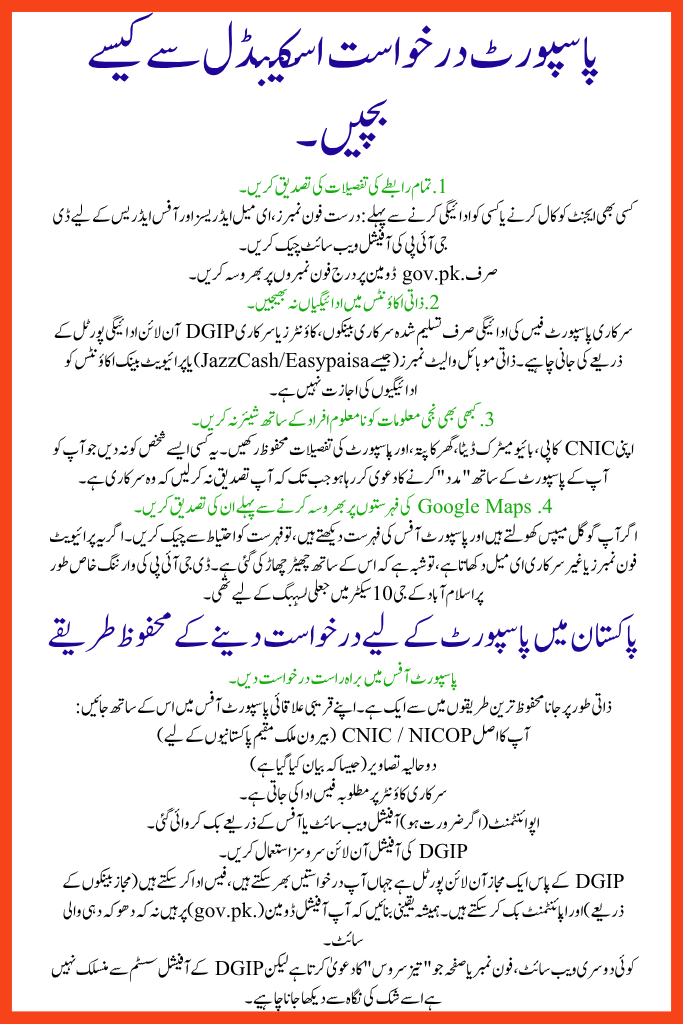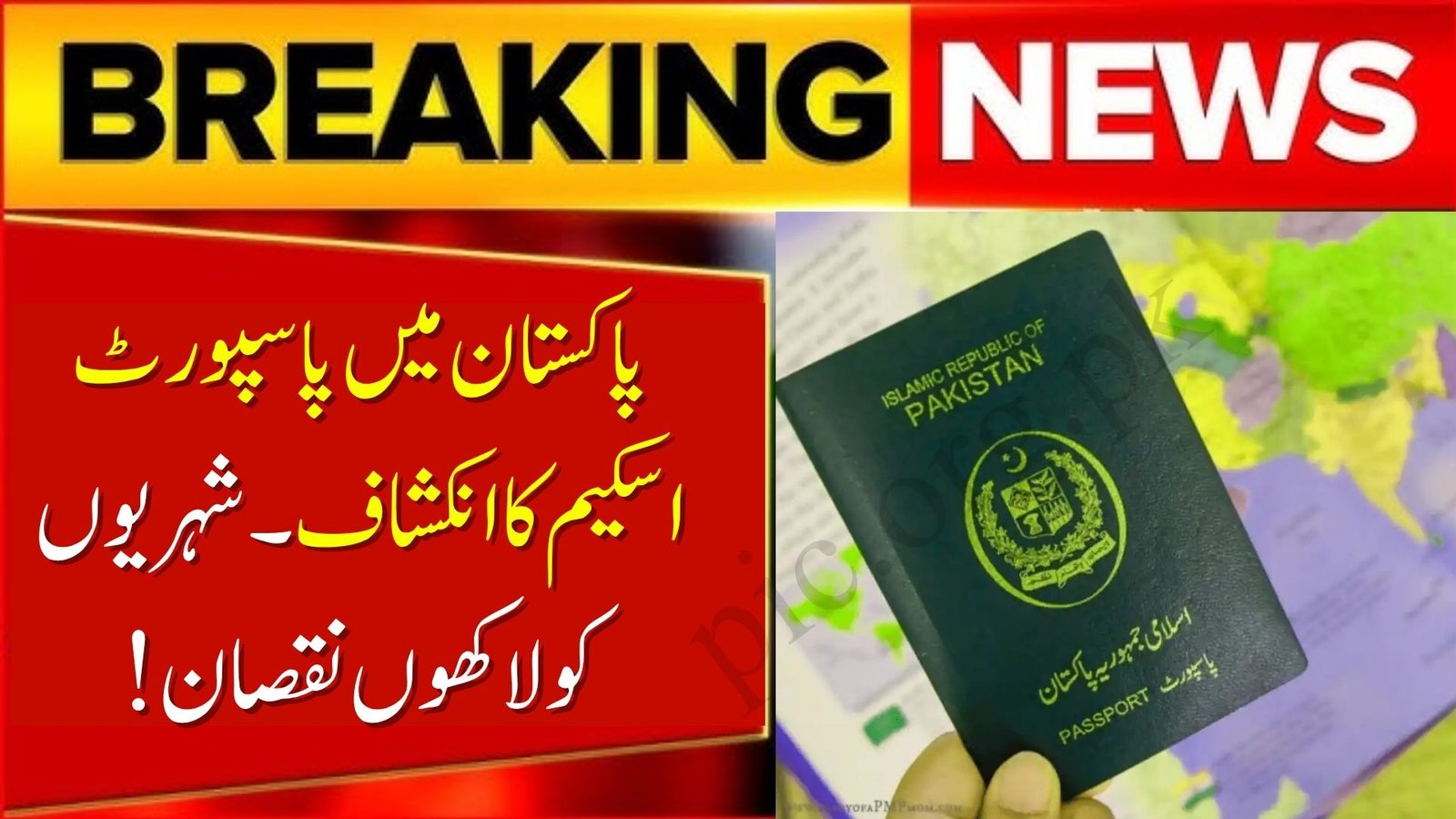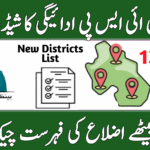Passport Application Scam in Pakistan
A serious scam has been uncovered in Pakistan involving passport applications, and the DGIP has delivered a strong warning to the public. Fraudsters are misusing digital platforms — mostly a fake listing for the Regional Passport Office in Islamabad’s G-10 sector — to trick applicants into disbursing fraudulent “fees”. This article gives you all the details: how the scam works, how to recognise it, how to avoid it, and what steps to shadow if you face it. After interpretation this, you should have full consciousness and know precisely how to keep safely.
Quick Summary Table for Passport Application Scam in Pakistan
Here is a short table of key information for quick reference:
| Field | Details |
|---|---|
| Name of Programme / Issue | Passport Application Scam in Pakistan |
| Start Date | Reported early November 2025 |
| End Date | Ongoing – no fixed end date yet |
| Method of Assistance / Action | Awareness and warning issued by DGIP |
| Method of Application | Official application via DGIP website or passport office only (online + offline) |
How the Passport Application Scam Works
Fake Listing on Google Maps
The DGIP found that fraudsters created or modified a Google Maps listing for the Regional Passport Office in Islamabad (G-10 sector), showing fake contact numbers and email addresses.
Contact via Personal Channels
After listing the fake information, the scammers contact applicants and ask for payments or personal details. They use:
- Personal mobile phone numbers.
- Private bank accounts (for example bank transfers) or mobile wallets such as JazzCash or Easypaisa.
Pretending to Be Official
They claim they can give you “VIP processing”, “early appointment”, or “fast-track service”, but in reality they are not authorised by the DGIP. The DGIP has confirmed that no individual or private agent is authorised to collect passport-processing fees through personal channels.
What Victims Lose
People who fall victim generally suffer:
- Loss of money paid to the fraudster
- Compromised identity: they may share their CNIC number, passport details, home address
- Risk of identity theft, misuse of personal information in future
DGIP’s Official Warning to Citizens
The Passport Application Scam in Pakistan DGIP has specifically stated:
“Beware: Do not share your personal information or make any payments to such individuals.”
They advise citizens:
- Only trust the official DGIP website: www.dgip.gov.pk
- Use the official helpline: 051-111-344-777
- Follow the verified social media handle @dgipofficial (or equivalent) for authentic updates.
If anyone demands payment outside the official government payment channels (bank, government counters) they should be treated as a scam attempt.

Why Passport Scams Are Increasing in Pakistan
High Demand for Travel Documents
In recent times the demand for passports has surged due to:
- Overseas employment opportunities for Pakistanis
- Student visas and foreign education
- Travel, tourism, and family visits abroad
This high demand creates fertile ground for fraudulent actors.
Digital Platforms & Weak Verification
Scammers exploit weaknesses in online listings (such as Google Maps) by publishing fake contact information, taking advantage of people who may not verify properly.
Shortcut Mentality
Some applicants are willing to pay extra in hopes of “fast-track” processing. Scammers promise these shortcuts, which makes people vulnerable. Victims often pay upfront and then get no service or have their application delayed anyway.
How to Avoid the Passport Application Scam
1. Verify All Contact Details
Before calling any agent or paying anybody: check the official DGIP website for correct phone numbers, email addresses and office addresses.
Only trust phone numbers listed on the .gov.pk domain.
2. Do Not Send Payments to Personal Accounts
Official passport-fee payments should only be made through recognised government banks, counters or the official DGIP online payment portal. Payments to personal mobile wallet numbers (like JazzCash/Easypaisa) or private bank accounts are not authorised.
3. Never Share Private Information with Unknown Persons
Keep your CNIC copy, biometric data, home address, and passport details safe. Do not give this to anyone calling you claiming to “help” with your passport unless you have verified they are official.
4. Confirm Google Maps Listings Before Trusting Them
If you open Google Maps and see a listing for the passport office, check the listing carefully. If it shows private phone numbers or non-official email, suspect it may have been tampered with. The DGIP warning was specifically for a fake listing in Islamabad’s G-10 sector.
What to Do If You Encounter a Fake Passport Agent
If you believe someone is committing a scam:
- Stop all communication with that person or agency immediately.
- Collect proof: screenshots of messages, payment requests, bank account numbers, any emails.
- Report the case to DGIP: use the official helpline (051-111-344-777) or email address for complaints.
- If identity theft or fraud is involved, you may also consider filing a complaint with Federal Investigation Agency (FIA) Cyber Crime Wing. Public reporting helps shut down these fraud networks.
Safe Ways to Apply for a Passport in Pakistan
Apply Directly at a Passport Office
Going in-person remains one of the safest methods. Visit your nearest regional passport office with:
- Your original CNIC / NICOP (for overseas Pakistanis)
- Two recent photographs (as specified)
- Required fee paid at the official counter
- Appointment (if required) booked through the official website or office
Use DGIP’s Official Online Services
The DGIP has an authorised online portal where you can fill applications, pay fees (through authorised banks) and book appointments. Always ensure you are on the official domain (.gov.pk) and not a fraudulent site.
Any other website, phone number or page that claims “faster service” but is not linked to the DGIP’s official system should be regarded with suspicion.
DGIP’s Continued Efforts to Protect the Public
The Passport Application Scam in Pakistan DGIP is actively working to:
- Strengthen verification systems of office listings (including Google Maps listings) so fake listings are removed.
- Increase public awareness about such scams through official warnings and media releases.
- Enhance cybersecurity and digital monitoring to detect and shut down fraudulent operations quicker.
- Thank citizens for reporting suspicious behaviour, and encourage public participation in detection of such scams.
Conclusion
The passport application scam in Pakistan is a stark reminder that in the digital age, fraudsters will exploit any gap. But you can protect yourself by following simple precautions: always verify the contact details, don’t pay through personal accounts, keep your personal data safe, and use only the official channels of the DGIP. Trust only the DGIP website, the official helpline and verified social media.
Shortcuts promising “VIP service” or “fast approval” are often traps. Stay alert, stay safe — and only use the authorised process when applying for your passport. That way, you avoid losing money, risking your identity or getting caught in fraudulent schemes.










